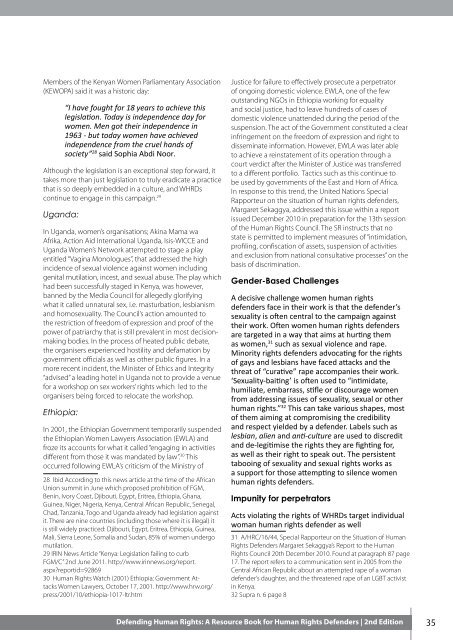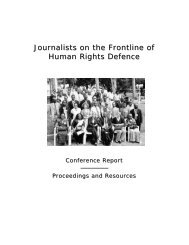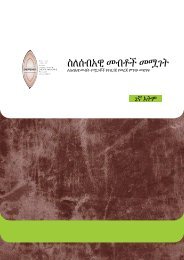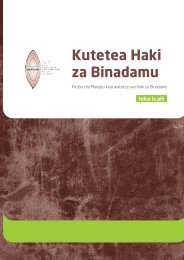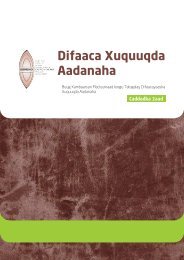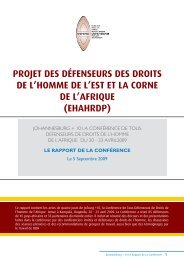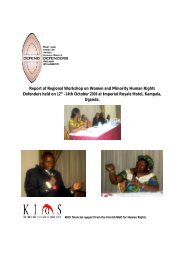Defending Human Rights: A Resource Book for Human
Defending Human Rights: A Resource Book for Human
Defending Human Rights: A Resource Book for Human
You also want an ePaper? Increase the reach of your titles
YUMPU automatically turns print PDFs into web optimized ePapers that Google loves.
Members of the Kenyan Women Parliamentary Association<br />
(KEWOPA) said it was a historic day:<br />
“I have fought <strong>for</strong> 18 years to achieve this<br />
legislation. Today is independence day <strong>for</strong><br />
women. Men got their independence in<br />
1963 - but today women have achieved<br />
independence from the cruel hands of<br />
society” 28 said Sophia Abdi Noor.<br />
Although the legislation is an exceptional step <strong>for</strong>ward, it<br />
takes more than just legislation to truly eradicate a practice<br />
that is so deeply embedded in a culture, and WHRDs<br />
continue to engage in this campaign. 29<br />
Uganda:<br />
In Uganda, women’s organisations; Akina Mama wa<br />
Afrika, Action Aid International Uganda, Isis-WICCE and<br />
Uganda Women’s Network attempted to stage a play<br />
entitled “Vagina Monologues”, that addressed the high<br />
incidence of sexual violence against women including<br />
genital mutilation, incest, and sexual abuse. The play which<br />
had been successfully staged in Kenya, was however,<br />
banned by the Media Council <strong>for</strong> allegedly glorifying<br />
what it called unnatural sex, i.e. masturbation, lesbianism<br />
and homosexuality. The Council’s action amounted to<br />
the restriction of freedom of expression and proof of the<br />
power of patriarchy that is still prevalent in most decisionmaking<br />
bodies. In the process of heated public debate,<br />
the organisers experienced hostility and defamation by<br />
government officials as well as other public figures. In a<br />
more recent incident, the Minister of Ethics and Integrity<br />
“advised” a leading hotel in Uganda not to provide a venue<br />
<strong>for</strong> a workshop on sex workers’ rights which led to the<br />
organisers being <strong>for</strong>ced to relocate the workshop.<br />
Ethiopia:<br />
In 2001, the Ethiopian Government temporarily suspended<br />
the Ethiopian Women Lawyers Association (EWLA) and<br />
froze its accounts <strong>for</strong> what it called “engaging in activities<br />
different from those it was mandated by law”. 30 This<br />
occurred following EWLA’s criticism of the Ministry of<br />
28 Ibid According to this news article at the time of the African<br />
Union summit in June which proposed prohibition of FGM,<br />
Benin, Ivory Coast, Djibouti, Egypt, Eritrea, Ethiopia, Ghana,<br />
Guinea, Niger, Nigeria, Kenya, Central African Republic, Senegal,<br />
Chad, Tanzania, Togo and Uganda already had legislation against<br />
it. There are nine countries (including those where it is illegal) it<br />
is still widely practiced: Djibouti, Egypt, Eritrea, Ethiopia, Guinea,<br />
Mali, Sierra Leone, Somalia and Sudan, 85% of women undergo<br />
mutilation.<br />
29 IRIN News Article “Kenya: Legislation failing to curb<br />
FGM/C” 2nd June 2011. http://www.irinnews.org/report.<br />
aspxreportid=92869<br />
30 <strong>Human</strong> <strong>Rights</strong> Watch (2001) Ethiopia: Government Attacks<br />
Women Lawyers, October 17, 2001. http://www.hrw.org/<br />
press/2001/10/ethiopia-1017-ltr.htm<br />
Justice <strong>for</strong> failure to effectively prosecute a perpetrator<br />
of ongoing domestic violence. EWLA, one of the few<br />
outstanding NGOs in Ethiopia working <strong>for</strong> equality<br />
and social justice, had to leave hundreds of cases of<br />
domestic violence unattended during the period of the<br />
suspension. The act of the Government constituted a clear<br />
infringement on the freedom of expression and right to<br />
disseminate in<strong>for</strong>mation. However, EWLA was later able<br />
to achieve a reinstatement of its operation through a<br />
court verdict after the Minister of Justice was transferred<br />
to a different portfolio. Tactics such as this continue to<br />
be used by governments of the East and Horn of Africa.<br />
In response to this trend, the United Nations Special<br />
Rapporteur on the situation of human rights defenders,<br />
Margaret Sekaggya, addressed this issue within a report<br />
issued December 2010 in preparation <strong>for</strong> the 13th session<br />
of the <strong>Human</strong> <strong>Rights</strong> Council. The SR instructs that no<br />
state is permitted to implement measures of “intimidation,<br />
profiling, confiscation of assets, suspension of activities<br />
and exclusion from national consultative processes” on the<br />
basis of discrimination.<br />
Gender-Based Challenges<br />
A decisive challenge women human rights<br />
defenders face in their work is that the defender’s<br />
sexuality is often central to the campaign against<br />
their work. Often women human rights defenders<br />
are targeted in a way that aims at hurting them<br />
as women, 31 such as sexual violence and rape.<br />
Minority rights defenders advocating <strong>for</strong> the rights<br />
of gays and lesbians have faced attacks and the<br />
threat of “curative” rape accompanies their work.<br />
‘Sexuality-baiting’ is often used to “intimidate,<br />
humiliate, embarrass, stifle or discourage women<br />
from addressing issues of sexuality, sexual or other<br />
human rights.” 32 This can take various shapes, most<br />
of them aiming at compromising the credibility<br />
and respect yielded by a defender. Labels such as<br />
lesbian, alien and anti-culture are used to discredit<br />
and de-legitimise the rights they are fighting <strong>for</strong>,<br />
as well as their right to speak out. The persistent<br />
tabooing of sexuality and sexual rights works as<br />
a support <strong>for</strong> those attempting to silence women<br />
human rights defenders.<br />
Impunity <strong>for</strong> perpetrators<br />
Acts violating the rights of WHRDs target individual<br />
woman human rights defender as well<br />
31 A/HRC/16/44, Special Rapporteur on the Situation of <strong>Human</strong><br />
<strong>Rights</strong> Defenders Margaret Sekaggya’s Report to the <strong>Human</strong><br />
<strong>Rights</strong> Council 20th December 2010. Found at paragraph 87 page<br />
17. The report refers to a communication sent in 2005 from the<br />
Central African Republic about an attempted rape of a woman<br />
defender’s daughter, and the threatened rape of an LGBT activist<br />
in Kenya.<br />
32 Supra n. 6 page 8<br />
<strong>Defending</strong> <strong>Human</strong> <strong>Rights</strong>: A <strong>Resource</strong> <strong>Book</strong> <strong>for</strong> <strong>Human</strong> <strong>Rights</strong> Defenders | 2nd Edition 35


